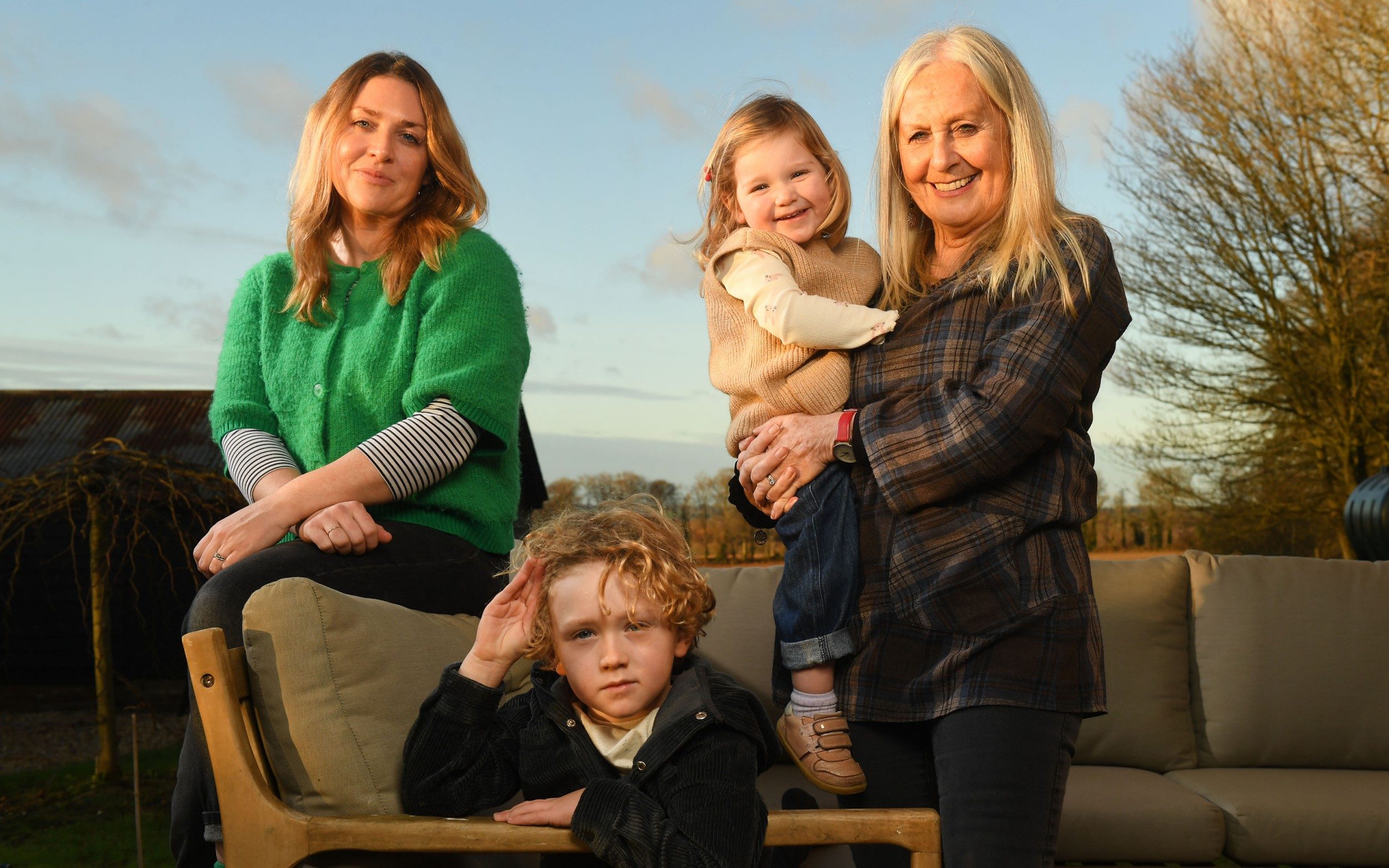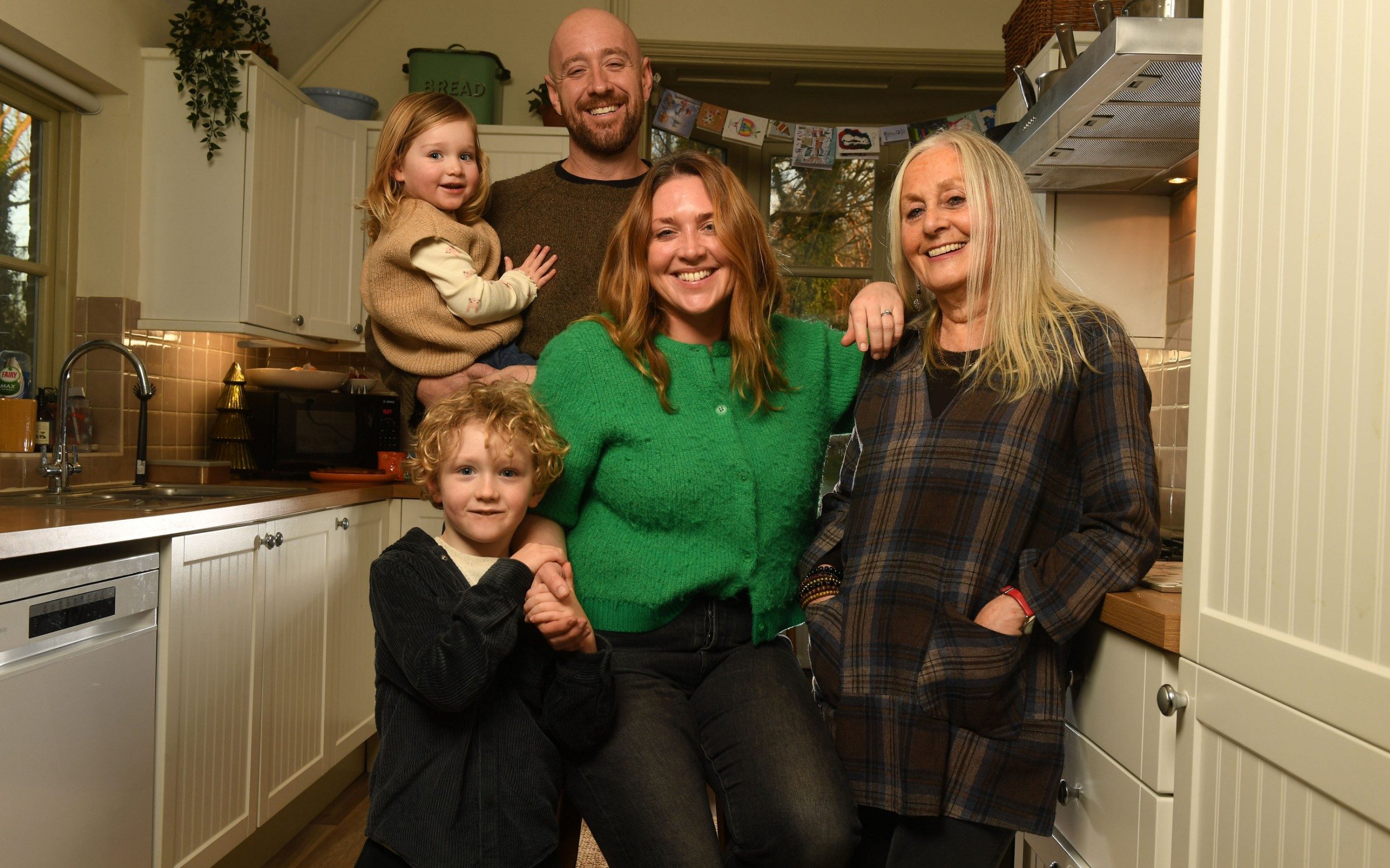
Karen King-Wilson and her husband Jamie had big dreams for the historic Grade II-listed farmhouse in the East Sussex countryside they bought three and a half years ago.
“This was our retirement home and we had all sorts of plans to upgrade and love the property,” she says. “It was further than we wanted to be from the grandchildren but it was a compromise and a brilliant place for them to come and play – a lovely old house with a lake, woodland and fields.”
Yet, tragically, the couple had only lived there for two years when Jamie was diagnosed with cancer and died. The house, which has more than six acres of land, is too much for King-Wilson on her own, so she’s selling up and moving a two-and-a-half hour drive away to Hampshire, to be where her daughter and two young grandchildren live.
“We lost so much time together during Covid and I don’t want to miss out any more. We FaceTime all the time but it’s not the same as a cuddle,” says King-Wilson.
Relocating means the 73-year-old will also be on hand for babysitting duties for her daughter, Susie Czopor, and her husband, Joel, who run a thriving village pub, The Tichborne Arms.
“They have very busy lives so, if I’m close by, they don’t have the worry of finding someone to look after the children last-minute,” King-Wilson says. “People now live so far away from their families, and I don’t think it’s a change for the better as the bonds between children and grandparents are so important.”

Moving to be closer to adult children and grandchildren – a phenomenon dubbed “baby chasing” in America – is a growing trend on this side of the Atlantic too, especially since the pandemic. A survey of 2,000 grandparents across the UK by the retirement home developer McCarthy Stone found that over a quarter had moved house in the previous five years
Given higher mortgage rates and the fact older generations enjoy the lion’s share of property equity – the over-50s now hold 78pc of all the UK’s privately held housing wealth, according to Savills estate agency – it’s often easier for mortgage-free grandparents to sell up and move rather than the other way round.
This is backed up by data showing that older generations are travelling further. Analysis of Experian data by Savills found that over-60s moved a median distance of 6.6km away, compared with under-60s who travelled 5.4km.
The quarter of older people moving the furthest travelled 27.3km on average, noticeably higher than the 21.7km for under-60s.
While being closer to family is a key driver of baby chasing, finances are also crucial motivating factors. The UK has some of the highest childcare costs in the world, with a couple on an average salary spending a quarter of their average household income on childcare costs, according to the OECD.
, up from 52pc in 2023, with grandparents giving up an average of almost four hours a day.
The increasing requirement for employees to work in the office, meaning they need extra hours of childcare to cover commuting, is making the need for “granny babycare” even greater, points out Carl Underhill, of Batcheller Monkhouse estate agency.
Historically, families would typically stay as units, living close by so that they could help each other out, bring up the children and look after older family members. That shifted in the 1960s, when baby boomers began routinely moving hundreds of miles away to university or to work.
But now economics – and emotion – are changing things, with baby chasing becoming far more prevalent than it was 10 or 15 years ago.
James Greenwood, of Stacks Property Search, says: “With tighter budgets all round, the increasing costs of childcare, the rising costs of maintaining draughty old family homes, and family becoming more important, it’s a trend that will inevitably grow.”
And it’s mutually beneficial. “When the grandparents are younger, they’re on hand to do lots to help, but as they age and need help themselves, the children are local and available to step in without having to cross the country,” Greenwood explains.
The average care home cost in the UK rose by up to 19pc between 2021 and 2023, according to the healthcare data provider LaingBuisson. It says the average weekly fee for a residential care home bed is now £949, rising to £1,267 a week for a nursing home bed.
Recommended
'My mother was lonely in Greece – so we built a £150,000 annexe for her in our back garden'
While some grandparents are moving nearby, others are moving in. Claire Whisker, of the property advisory platform First In The Door, says: “We’ve had more requests for homes with self-contained annexes within the main home, and coach houses or garages which could be converted into small flats for grandparents in the last month or so than we have previously.” “Annexe” was the third most searched-for term on Zoopla in 2024, topped only by “freehold” and “garage”.
Baby chasing increasingly means grandparents can provide financial support by using the equity they release by downsizing. “We used to talk about the bank of mum and dad, but now it’s the bank of grandma and grandpa,” says Claire Carter, of John D Wood & Co.
– as well as to be closer to the kids and grandkids – is a huge theme.”
It is having a significant impact on housing markets in south-east England, says Robin Edwards, of Curetons Property Finders. “It has driven demand for smaller, single-level homes or retirement-friendly housing in what were primarily family commuter regions.”
Given that increasing numbers of baby chasers are moving to the commuter belt and even London, developers are taking note and increasingly seeking to build luxury so-called “age-exclusive” properties there; for instance, the retirement homes provider Audley recently opened Nightingale Place in Clapham, its first London village.
have increased significantly, according to analysis by Knight Frank. The estate agency says that, as of the third quarter of 2024, there were 57 private retirement housing applications in London, up from zero in the same period last year, while there were 2,171 applications in the South East, up from 58 last year.
Baby chasing doesn’t come without its challenges, however, not least because grandparents must leave friends and communities behind and get to know a whole new place. Relocating to a more expensive area may mean a significant housing downgrade from what they were used to, while there’s also no guarantee that family will stay in the area to which grandparents have packed up and moved.
Jonathan Harington, of buying agency Haringtons UK, says: “Younger families often uproot themselves for a new job, a fresh start, or simply a lifestyle change. This constant mobility can leave grandparents facing a tricky choice: stay put in a place they moved to purely for family, or pack up and follow them again.”
Harington knows a couple who relocated from south Devon to Cardiff to be near their daughter only to find that, a few years later, she landed a job elsewhere. “They decided to follow – but not without hesitation,” he says.
Rupert Oliver, a property agent in Bristol, regularly comes across baby chasers. “It really started in a big way after Covid, when people aged about 65 to 70 realised they weren’t invincible and it might be sensible to move somewhere smaller, release some money and help their kids out,” he says.
, about 500 metres from his son and his two youngest grandchildren, who are aged eight and five. Richard’s other two children and four grandchildren are also nearby.
“This will make a huge difference and mean our kids will see their grandfather every other day, rather than once every few weeks or months,” Oliver says. “My mother-in-law also moved over here from Dublin five years ago and it’s wonderful that the children see her several times a week.”
For Richard Oliver, a retired army officer in his early 80s, the move to his new home has been a relief and given him a newfound cultural life. “It’s a gem, perfectly positioned to enable me to make the most of the vibrant, youthful city and everything is within easy walking distance,” he says.
“I can meet my older grandchildren for coffee in the centre and the youngest at home. Visits to Bristol Old Vic, the Hippodrome and Bristol Beacon have rekindled my enjoyment of live performance and I have so many restaurants practically on my doorstep. All I need now is somewhere to keep some bees.”


Post a Comment
0Comments